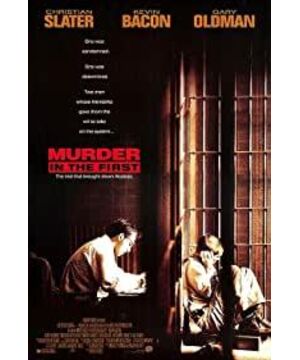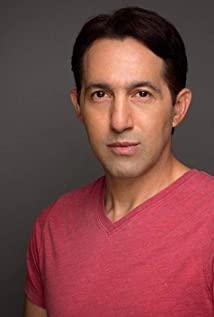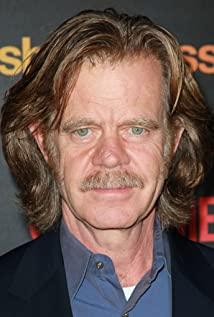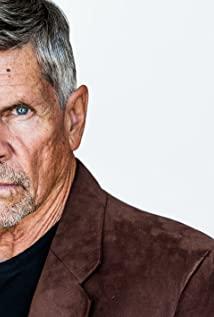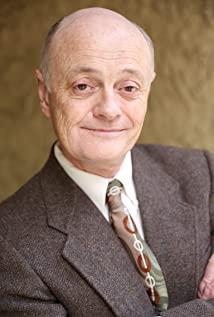At the beginning of the film, in 1938, three inmates escape from the Alcatraz prison on an island in San Francisco. One of the inmates was shot dead on the spot, and the other two, Rufus and Henry Young, were caught. Henry Young didn't know that Rufus had actually sold their escape plan to Warden Glenn in exchange for preferential treatment from the prison. And the hapless Henry Young was thrown into the dungeon by Glenn. Glenn hated Henry Young to the core because his escape hampered his path to promotion. For the next three years, Henry Yang was imprisoned in solitary confinement in a dark and damp dungeon all day long, accompanied by his own excrement and urine, and suffered all kinds of bullying by the jailers, with only half an hour of free time every year. Glenn also frantically severed his hamstring. Henry Yang would not have been released from the dungeon at all if Glenn’s superior Hun Sen had not reminded him that Henry Yang had been in solitary confinement for too long.
On the day he was released from solitary confinement, Henry Yang took a bath and shaved his hair, and ate with other prisoners in the cafeteria. A good man said to him: Look, that's Rufus, he betrayed you, and now he is comfortable. Hearing this, Henry Yang immediately rushed up and overturned Rufus to the ground, and slammed the metal spoon he used to eat into Rufus' neck, causing him to rupture his carotid artery and died on the spot. Henry Young killed Rufus clearly and unequivocally in front of more than two hundred prisoners and prison guards.
As a result, the protagonist of the film, James, who just graduated from Harvard Law School and was admitted to the lawyer's license, appeared on the stage. The law firm he worked for assigned the Henry Young case to James to serve as Henry Young's legal aid attorney. In the words of the person in charge of the law firm: This case is no different from a monkey. Because the facts of the case are clear and the evidence is conclusive, Henry Young's conviction for first-degree murder is only a procedural issue. Under California law, first-degree murder is punishable by death.
Young James was excited to receive his first case in his career. He first went to the place where Henry Yang was imprisoned—the court’s cell to meet Henry Yang. He insisted on walking into the iron cage where Henry Young was being held to meet him, which even the bailiffs thought was unnecessary. They had already prepared tables and chairs for him outside the iron cage.
To James' surprise: Henry Young was reluctant to have any communication with him. He curled up in the corner of the cage like a frightened animal, refusing to make eye contact with James or answer any of his questions. While the average legal aid lawyer might be happy to just walk away, James relentlessly asked Henry Young question after question. He checked Henry Young's case file beforehand and found that Henry Young had been arrested ten years ago for robbing a store of five dollars. Since the store also happened to be a post office, his charges were aggravated. James deliberately said to Henry Yang: I know you were arrested for five hundred dollars before, and Henry Yang corrected him and said: It was five dollars.
James managed to get Henry Yang to speak, and immediately wanted to discuss the case with him. Unexpectedly, Henry Yang then asked him: what was the record of the famous baseball player DiMaggio at that time. James was not interested in baseball, so he told Henry Young the truth. And Henry Yang immediately returned to the state of refusing to communicate at the beginning, regardless of what James said to him.
James couldn't, he could only go back and make up for the reports about DiMaggio and report DiMaggio's glorious sports career to Henry Young in the next meeting. His actions made Henry Yang begin to communicate with him slowly, but the latter was reluctant to talk about the case. On the first day of the case, James applied to the judge for a 60-day extension, citing that due to Henry Young's autism, he had not discussed the case with his client. Although the judge was very dissatisfied, he still agreed to an extension of one week.
During this week, James finally learned from Henry Yang the fact that he had been in solitary confinement for three years and two months, and the law stipulates that the longest solitary confinement for a person can only be 19 days. James started from this entry point and proposed that Alcatelz Prison, Warden Glenn and his superior Hun Sen should all be listed as defendants because they caused Henry Young to become a murderer. James' debate brought Henry Young's trial into the news, and he himself came under pressure from all sides. Because Hun Sen is a red man under Hoover's account, and he has great power. His boss even wanted to disqualify him from defending Henry Yang, and James, not to be outdone, stubbornly withstood these pressures and continued to defend Henry Yang.
In order to obtain evidence of Henry Young's abuse in prison, he obtained an investigation order from the court and came to Alcatelz with his girlfriend Mary and a photographer to collect evidence. Talking to the prisoners, they found that they all seemed to have been rehearsed beforehand and were reluctant to say anything. Glenn himself was obstructing them from taking pictures of the dungeon where Henry Young was being held. James had to use an investigative warrant to get down the dungeon. He was stunned by what was inside.
In order to prevent James from exposing the prison situation, Glenn and others put pressure on the law firm. James' superiors assigned Mary to defend Henry Young, and James was not allowed to intervene in the case. But Henry Young's actions made Mary reluctant to defend him. James resigned from the law firm, set up his own business, and became Henry Young's defense attorney again. Henry Young likes James because James is about the same age as him and is willing to spend time chatting with him. He feels that James is his friend. Although he himself did not hold any hope for his own destiny and wanted to die, but seeing James' enthusiasm for his case, he was willing to use his own words to accompany James to play. James himself, also regarded Henry Young as a friend. The two share their teenage years with each other. Under the influence of Henry Young, James gradually became a baseball fan.
In Henry Young's case, as the trial progressed, even Hoover intervened, because Hun Sen was a senior official of the Ministry of Justice, and he did not want to see the reputation of the senior official damaged. They couldn't put pressure on James, they put pressure on his brother. James' older brother Byron is already a well-known lawyer, and he also raised James after his parents died, so James respects him very much. Byron goes to James and persuades him to drop the case, and James says he only cares about justice. He couldn't even believe his own brother. In order to help the prosecution, Byron stole the photo of James' witness, which resulted in the key witness's testimony not being accepted by the judge.
James is now a betrayal of relatives, and he can only insist on himself. He defied all opinions and overcame many difficulties to get both Glenn and Hun Sen to testify in court, and let them collapse through his wonderful questions, exposing Glenn's brutal and ruthless character and Hun Sen's laissez-faire for Glenn's management of the prison. James also gave prosecutors, judges and juries an inside look at the Alcatraz prison by presenting evidence he collected at the prison. By this stage, everyone is convinced that Henry Young's murder was caused by the brutality of the prison, especially Warden Glenn, against Henry Young.
Victory in this case is already within the reach of James. Due to his unremitting perseverance and hard work, the prosecutors and judges who were hostile to him from the beginning turned to appreciate this stunned young man, and even used their professional knowledge to help him. According to the appearance of the trial, James told Henry Young that the jury would charge him from first-degree murder to second-degree murder, and even ordinary murder was possible, and he would only need to serve a maximum of ten years in prison to be free. .
However, to James' surprise, Henry Young asked him to intercede with the judge and sentence him to death.
Because, even if he escaped death, he would still be serving time in Alcatraz, and he would still have to face Glenn. Henry Yang was afraid of this, more than he was afraid of death.
James insisted that Henry Young was innocent, and that if Henry Young wanted to get himself sentenced to death, he would have to tell the judge and jury himself during the trial. As a result, under the question of James, Henry Yang shouted in court, "I would rather die than go back to Alcatraz prison! Because I am afraid of them. I am just a weapon, but I did not kill, they are the murderers."
In the end, the jury found Henry Young not guilty of first-degree murder, but guilty of manslaughter, with a three-year sentence. The jury also signed a petition calling for an immediate federal investigation into Alcatelz Prison after it found the prison and its warden guilty of crimes against humanity. James wins big.
Henry Young is still sent back to Alcatelz Prison to serve his sentence, and still has to face Glenn. But he was able to say to Glen, "I won, and you can't take it away from me." His body was found in the dungeon where he was being held the day before the appeal. He wrote the word "victory" on the ground with a stone. Seven months later, the dungeon of the Alcatraz prison was ruled by the Federal Supreme Court to be permanently closed. And Warden Glenn committed abuse. In 1963, Alcatraz Prison was permanently closed.
This is how the whole movie recounts how James indomitably won his first case, and in this case, everyone said at first that he was a loser. I'm not going to talk about how good a few actors are: Kevin Bacon as Henry Young, Gary Oldman as Glenn, and their performances are unforgettable. However, the question that this film made me think about the most was why the diehard lawyer James was able to succeed.
First of all, he loves his profession, and he wanted to be a lawyer since he was a child, fighting each other in court. He has a fiery passion for justice. When he first received the case, the prosecutor thought it would only take six minutes to complete the trial, and he kept the trial going for at least six months, during which time he revealed the dark insides of the Alcatraz prison. Everyone thought Henry Young was guilty at the beginning, and he proved that Henry Young was not a murderer for no reason, he was just a victim of Alcatraz prison. It must be a miracle that a fledgling legal aid lawyer turned an iron-clad case over and exposed the darkness of the prison system along the way.
Second, he not only has professional spirit, but also professional skills. James' brother is a lawyer, and he was raised by his brother since he was a child. He himself has further studied at Harvard Law School, and the school has cultivated his excellent trial defense skills. He can control witnesses in court, and use clever questions to make witnesses expose themselves to achieve the effect he wants to achieve. Trials in the United States are wonderful because lawyers and prosecutors debate on a par.
Finally, and most importantly, he benefited from the American judicial system. The United States is the country with the most complete separation of powers in the world, and not only is the separation of powers, but they also check and balance each other. This system guarantees the independence of the judiciary. We can also see in the film that in prisons, where power is not supervised, only horrific crimes such as corruption and inhumanity are prevalent. There are many other films, including the famous Shawshank Redemption, that reflect the darkness of American prisons. And only the tireless efforts of diehard lawyers like James, as well as journalists and other righteous people to expose these darkness, can lead to the final improvement of the situation. The independent judicial system in the United States also ensures that diehard lawyers like James can exist. Although officials have used various methods to put pressure on him, they cannot make the court obey them. The detached status of the court ensures the impartiality of the judiciary. Officials have nothing to do with a troublesome "dung picker" like James, because he doesn't have to work for the government and can open a law firm by himself. What the outcome of this case in other countries will be, not to mention everyone knows. In addition, the United States also attaches great importance to the system of witnesses appearing in court. Lying is a manifestation of human nature, and the appearance of witnesses in court can help both the prosecution and the defense to cross-examine witnesses and find doubts. And lawyers can apply for anyone to testify in court. If the witness is unwilling, the court can force him to appear.
In the movie, James, a die-hard lawyer, still fights with prosecutors, with officials hidden behind the scenes, and even with Henry Yang despite being isolated and helpless. Henry Yang actually only wanted to die. He regarded James as a friend, so he let him die all the way. Such a lawyer will surely have a brilliant career in the future, because he not only has excellent professional skills, but also firmly believes that justice will prevail.
Do you think this character is too inspiring?
In fact, the film is based on real events.
View more about Murder in the First reviews


